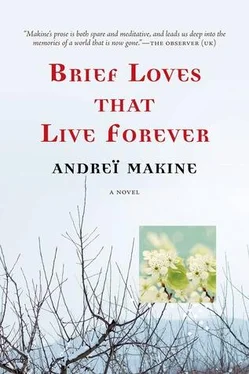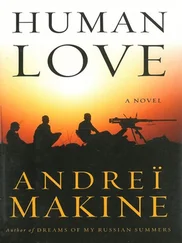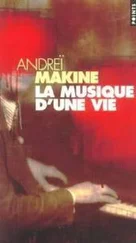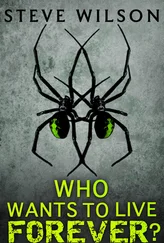And then this photograph: a young woman with long, dark hair, a mother holding a child in her arms whose gaze was curiously directed to one side.
“Does that interest you?”
I gave a start, backing away abruptly from the window and colliding with the person who had just called out to me. I turned around, openmouthed, trying to find excuses, explanations. An adolescent girl, scarcely older than myself, was staring at me fearlessly, but also without hostility, which gave me courage and left me time to study her: a mass of raven hair tied back with a scarlet ribbon, big, dark eyes, and a rather grown-up air that, mysteriously, seemed familiar to me … I hastened to give high-sounding reasons for my espionage. “It’s for our history lessons. I’d like to meet the woman who’d seen Lenin …”
“So would I,” the girl cut in. “And it’s not the first time I’ve come here. But she’s never at home … My name’s Maya.”
I introduced myself, a little awkwardly, sensing that she belonged to a world where dealings between men and women, children and adults, were more relaxed thanks to codes of politeness my comrades either knew nothing of or regarded as signs of weakness.
We moved away from the blue building, walking slowly, following the village’s only street. I felt quite ill at ease, nervous lest I let slip one of those coarse expressions that made up our daily language at the orphanage, grasping, too, that an invisible bond had just been created between this girl and me and that I must be worthy of such a gift from fate. This Maya had a radiant beauty that, from minute to minute, became more magical, almost heartbreakingly so, still hinting at a hidden resemblance to a face I could not identify in my memory. On top of all this the time for the train was close and I was already picturing myself appearing with this new companion in front of my five brides. Their mockery, the teasing glances the passengers would give me in the midst of my harem …
Maya’s voice gradually calmed my fears. Hers was a more serious voice than the tones one might expect from a girl of thirteen or fourteen. More melancholy, too.
“This woman who’d seen Lenin is called Alexandra Guerdt. Her brother was killed in the First World War. After that she had only one dream: to rid the earth of rulers who send young men to their deaths, starve their peoples, and rob the weak. It was a dream of worldwide brotherhood, shared happiness. During the tsarist era she remained abroad, in Europe. That was where she met Lenin. He admired her greatly. He even entrusted her with a number of secret missions. They wrote special letters to one another, with an ordinary text, but, between the lines, words written in milk. Yes, milk! You had to hold the paper over a flame and then the words appeared … After the revolution she worked on his staff. She lived with a man who’d been a major in the Red Army cavalry. At the end of the thirties he was accused of treason and shot. As they weren’t married she only spent two years in prison. She was released because the war against Hitler had just started. She spoke several languages, German in particular. Stalin decided she could be useful … But then, after the war, she got another sentence, at the time of the struggle against cosmopolitanism …”
“Eh? Com-so-politism? What’s that? Political Komsomols?”
“No, it’s … well, there were people who were suspected of not loving their country enough. And that was when her husband (she’d met him during the war) disowned her. And worst of all, he brought up his children to despise their mother. She was too shaken by her life in the camps to put up a fight. She lived alone now. Many years later her innocence was recognized. They even returned her Party card and historians wrote about her. Then her family wanted to get back in touch. But she always refused …”
We reached the spot where the old combine lay dormant. The sky on that June day had become even more gray, and the wind was sweeping through the trees with a sad, autumnal sound. It was time to go back to the station. Maya was silent, her gaze lost in the distant mist over the fields, and from time to time she shook her head gently, as if expressing some refusal in a reverie where I no longer had any place. Yet I so much wanted to exist for her! I must attempt a subterfuge, which is why, in genial and flattering tones, and with a click of my tongue, I exclaimed, “Hey! You’re a real ace at history. I bet you’ve read a lot of books …”
She roused herself, gave me a vague smile, and murmured, “Not all that many. And in the books, you know, the woman who’d seen Lenin is given the name she assumed as a young revolutionary. The name I told you, her real name, Alexandra Guerdt … not many people know that.”
She fell silent again and I sensed a cord within her stretched to breaking point. Her voice resonated with a musical quality, close to tears: “I know the name, you see, because Alexandra Guerdt, she’s … my grandmother.”
She did not burst out sobbing but her breath came in gasps as she tried to speak: “I’ve got cousins who live in your city. But my family lives in Moscow. I lied to my parents. I told them I wanted to spend a week with my uncle and aunt. This was all so as to be able to come here, to Perevoz. Today’s my last day. Tomorrow I go back to Moscow. I’ve never been able to meet my grandmother. My father says she’s an old madwoman. And this village, you’ve seen it. What a wilderness! I’ve asked the caretaker a hundred times. She sent me packing. And she’s lying, in any case. I don’t know where my grandmother could be. She’s too old for long journeys and besides … She’s really very poor.”
We were walking back up the street toward the station. The drunkard’s window was wide open. I quickened the pace to protect Maya from defilement by oaths or smutty rhymes. But it was from behind a row of raspberry canes that Sashka called out to us, and this time his powerful voice was tinged with a strange lassitude.
“Get along home now. You’ll never see her, our good Alexandra. She’s not for the likes of two-faced bastards like you. As soon as any meddlers poke their noses in, she locks the door and goes off quick down the valley. She knows the timetables. They come on the midday train, all the stupid pricks who want to see her, and go back on the four twenty. I know the timetables, too. That’s all I do know. So piss off now and leave us in peace.”
He disappeared as abruptly as the first time.
Dumbfounded, we stood there face-to-face for a moment, then, with unspoken accord, we started to run toward the valley.
Just beyond the wreck of the combine harvester the meadow sloped more steeply. From above, beyond the thickets, the banks of a stream could be seen and, amid the willows, a footpath swamped with wild plants. A dark figure, still very far away, was walking slowly along the bank, coming toward the village. Despite the distance I could make out the ample chignon of white hair, an imposing, upright stature. In a fraction of a second the whole tale I had just heard, this tragic life story that had spanned the century, was condensed into a human presence.
“Go down, Maya! You must go down to her. Don’t wait for her here. Run!”
My whisper was on fire with emotion.
“No, I’m scared,” she muttered. “I can’t. She’ll never want to see me. She’ll drive me away. I can’t!”
I saw tears welling in her eyes.
“Yes, you can. You’ve got to. But you must go down to her. Go on!”
I grasped her by the arm to pull her along. She resisted.
“All right. Please yourself. You’re chicken! A little Moscow bitch! Well, I’ve got my train to catch. I’m not going to waste my time on a dope like you.”
Turning my back on her, I ran flat out toward the village.
Читать дальше









